It is often funny how these little items come back to us – about a week ago I met up with someone who I later described as looking a little like ‘Cardew The Cad’
Then, in fact only today, there was a Children’s Film Foundation production on Talking Pictures called ‘Go Kart Go’ from 1964 with a young Dennis Waterman and Frasier Hines – but also in the cast was Cardew Robinson. His name had cropped up twice within a short time
Back in the 50s and 60s there had been a levy / tax on the cost of a cinema seat which went to the Children’s Film Foundation enabling them to make films for the Saturday morning children’s shows that took place in all circuit cinemas. The films would always feature children as the main characters with a smattering of familiar faces in the adult roles.
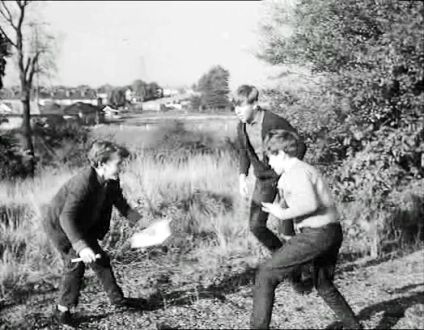
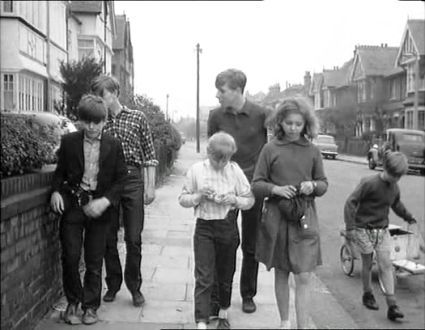
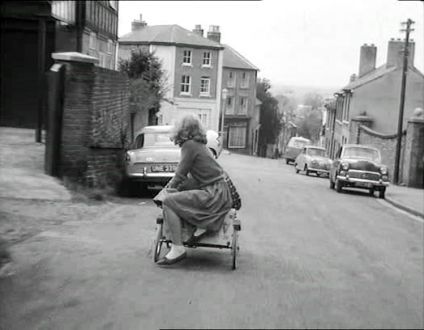
Many of these shots were filmed in Harrow
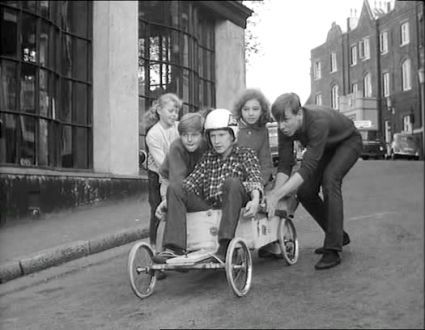
In this film Dennis Waterman plays the head of a gang of boys and girls who are trying to win a Go kart race.However their main rivals will stoop to underhand tactics to prevent Waterman winning.
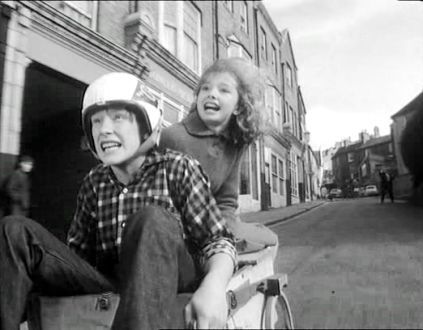
Will he win in the end ? Well just to help him we have such familiar actors as Cardew Robinson and Wilfred Brambell.
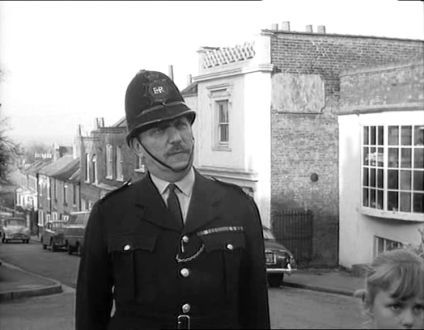
ABOVE – Another familiar face Campbell Singer
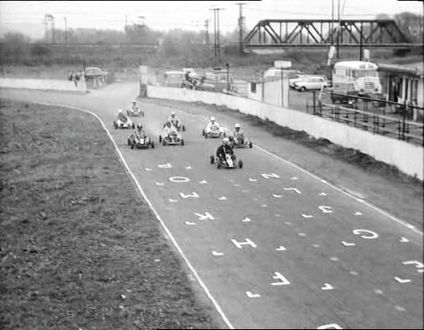
Cardew Robinson
I remember Cardew the Cad from the Radio Fun comics of the early fifties. He did seem to be around quite a bit on the Radio at that time.
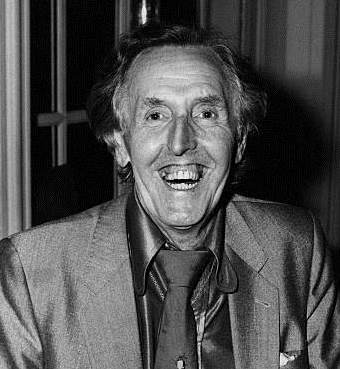
DOUGLAS ROBINSON was best known as a comedian for his characterisation of ‘Cardew the Cad of the School’. Clad in a striped school cap with a long scarf draped about his scrawny neck, the tall, bony body with prominent teeth, was a familiar figure of fun during the last days of the variety theatre and the early days of television. So popular was his schoolboy persona that he adopted his fictional name, becoming Cardew Robinson for professional purposes from the Fifties.
Robinson was born in Goodmayes, Essex, in 1917 and appeared in many of the Harrow County School concerts as a boy. Already touching six feet tall, and as very skinny, his appearance alone was enough to win the laughs of playmates and parents. Ambitions to become a writer led him to a local newspaper job, but hardly had he learned to type when the paper closed down. Remembering the fun of performing before his schoolmates, Robinson invested in a copy of the Stage, price twopence in those pre-war days, and immediately spotted an advertisement placed by one Joe Boganny who needed recruits for his touring team of Crazy College Boys. One look at the long, lean lad with the protruding teeth was enough for Boganny, who signed him up on the spot.
Boganny’s Crazy College was, as Robinson later wrote, ‘a sort of downmarket Will Hay team. It consisted of Boganny himself and his dog, whose sole purpose was to walk across the stage with a false dog’s head tied to its backside]’ The human part of the act was Robinson, two other boys, and two dwarfs. Robinson took over from a small boy and was given the original cut-down costume to wear. ‘That will look very funny on you, so you can be the comic,’ said Boganny. And he was. Robinson was given one line. ‘I say, you’re late, where do you come from?’ asked Boganny. ‘You say: ‘From a little place called Cookeroff,’ and I hit you on top of the head and say: ‘Well, you Cookeroff back again]’ ‘
In May 1934 Robinson and the Crazy Collegians opened at the Lyric Theatre, Hammersmith, dashed over to the Balham Hippodrome for two more houses, and rushed back to Hammersmith for the second house. The laughs came every time.
He later enlisted with a touring repertory company, he followed a part in Peter Pan with perhaps his most macabre moment in his career, as the monster in Frankenstein. Then came the Second World War.
Joining the RAF in 1939, AC2 Douglas Robinson found himself stationed at Uxbridge, where he quickly found a place in the camp shows. It was in 1941 that he came into contact with Squadron Leader Ralph Reader, the producer/entertainer/songwriter and set on several tours with ENSA
After demob, Robinson continued his association with Ralph Reader, starring in a variety tour of the RAF Gang Show mounted by the impresario Tom Arnold. Given the chance to perform a solo act as a stand-up comic, he developed an idea he had first tried out in 1942. This was ‘Cardew the Cad of the School’, inspired by his own boyhood reading of the weekly maagzine the Gem.
This featured tales of St Jim’s school written by the prolific Charles Hamilton under his pen-name Martin Clifford. Robinson had always enjoyed the caddish capers of Ralph Reckness Cardew, the schoolboy who was both suave and slightly sinister, and first as a rhyming monologue, then as a comedy act, eventually as a radio personality, the character began to take over his life.
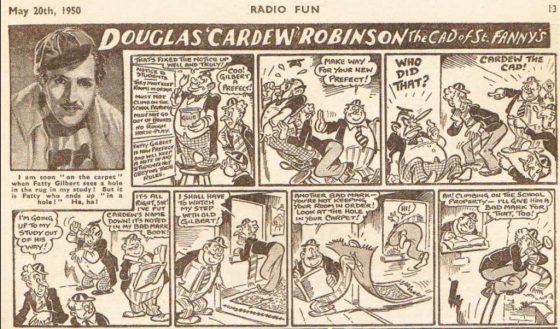
Listeners to the BBC’s popular Variety Bandbox responded with delight and Cardew Robinson became the programme’s resident comedian for a spell, reading out a weekly bulletin of school reports: ‘Here is the news from St Fanny’s and this is Cardew the Cad reading it’ By 1950 the listening world numbered the headmaster Dr Jankers, the fat boy Fatty Gilbert, and the delightful Matron among its comedy favourites, although the BBC never gave him the honour of his own radio series. In 1954 Robinson formally changed his name from Douglas to Cardew, and established his catchphrase, ‘This is Cardew the Cad’
Robinson had entered films as early as 1938, when he appeared in a short in the series Ghost Tales Retold, directed by Widgey R. Newman, a name to conjure with in the back-alleys off Wardour Street. He resumed his film career in 1948 in a slightly longer cheapie entitled A Piece of Cake, starring Cyril Fletcher. He would continue in films for the rest of his working life, appearing in more than 50 parts, medium-sized, small and smaller, but never larger than the one film in which he starred. This was Fun at St Fanny’s (1955), with a cast of comedians of every shape and size, from the elephantine Fred Emney, a superb Dr Jankers, to the diminutive Davy Kaye, plus the veteran Claude Hulbert, incomprehensible Stanley Unwin, bumbling Peter Butterworth and plump Gerald Campion, television’s Billy Bunter cast here as Fatty Gilbert. Young Ronnie Corbett played a schoolboy, and in support was the current king of the pop discs, Johnny Brandon, backed up by Francis Langford’s Singing Scholars (surely a sentimental throwback to Joe Boganny’s Crazy Collegians?).
The film, still unshown on British television, was recently revived at the Museum of London, where Cardew Robinson himself emerged lankily to introduce his one and only starring epic. The packed audience loved him, and also the film which, incidentally, was based on the comic strip which began in Radio Fun in 1949.
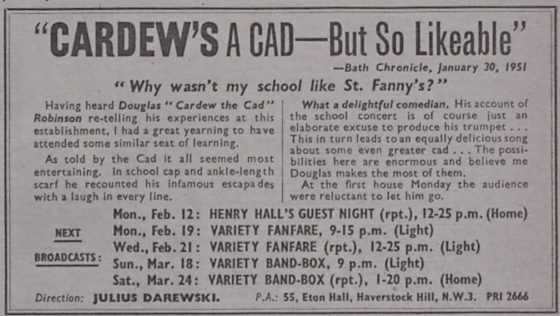
The film, still unshown on British television, was recently revived at the Museum of London, where Cardew Robinson himself emerged lankily to introduce his one and only starring epic. The packed audience loved him, and also the film which, incidentally, was based on the comic strip which began in Radio Fun in 1949.
Robinson’s longest stage stint was as King Pellinore in the Drury Lane production of Camelot – he appeared in all 650 performances – and in more recent times he was well received as an after-dinner speaker. His early hopes to become a writer were eventually realised, and, apart from comedy scripts for himself and fellow artistes including Dick Emery and Peter Sellers, he wrote a book, How to Be a Failure.
He also devised the radio game show You’ve Got to Be Joking, and guested on many television panels including Call My Bluff, Looks Familiar and Quick on the Draw.
… [Trackback]
[…] Information to that Topic: filmsofthefifties.com/go-kart-go-1964-cardew-the-cad/ […]
… [Trackback]
[…] Info on that Topic: filmsofthefifties.com/go-kart-go-1964-cardew-the-cad/ […]
philucky https://www.usphilucky.org